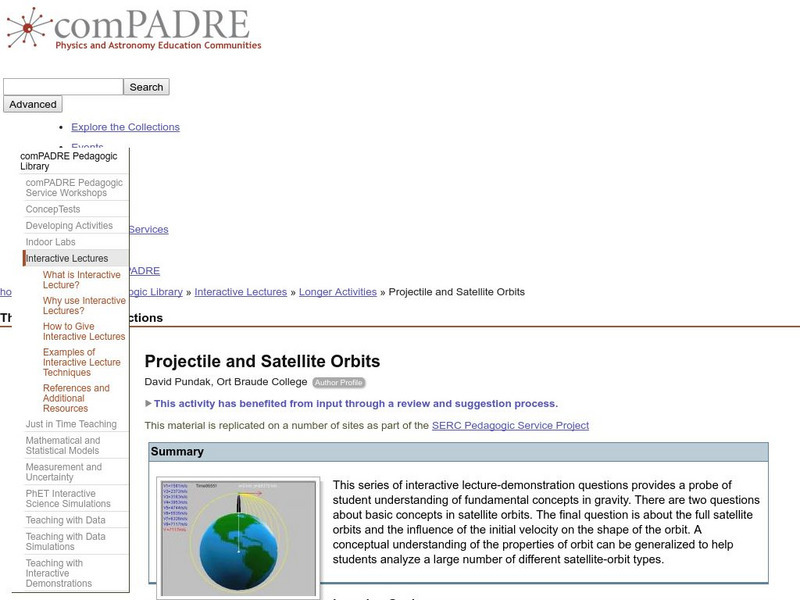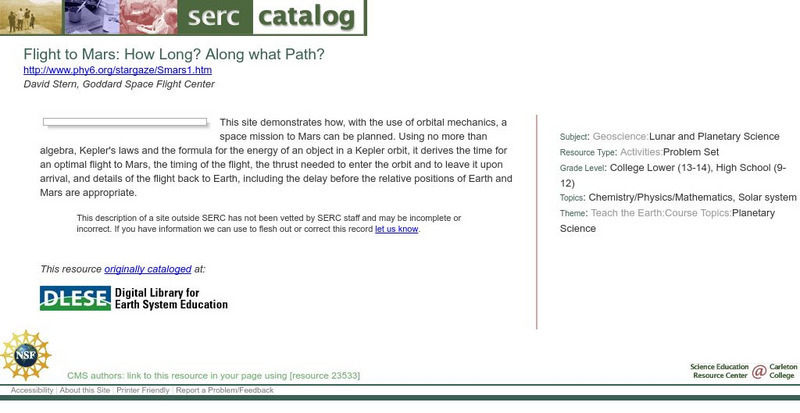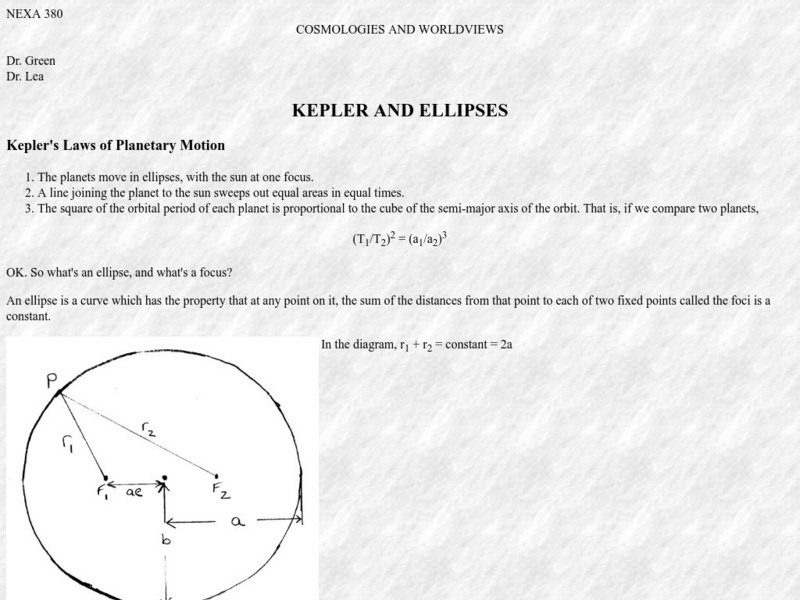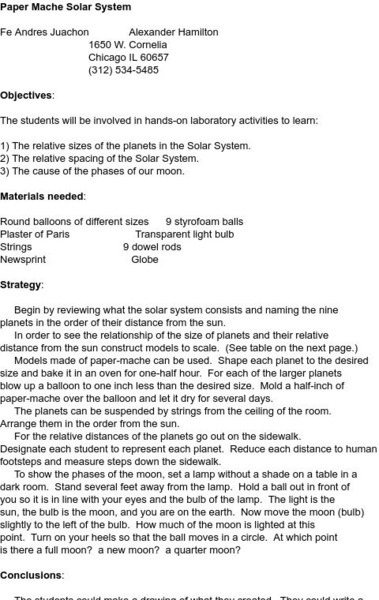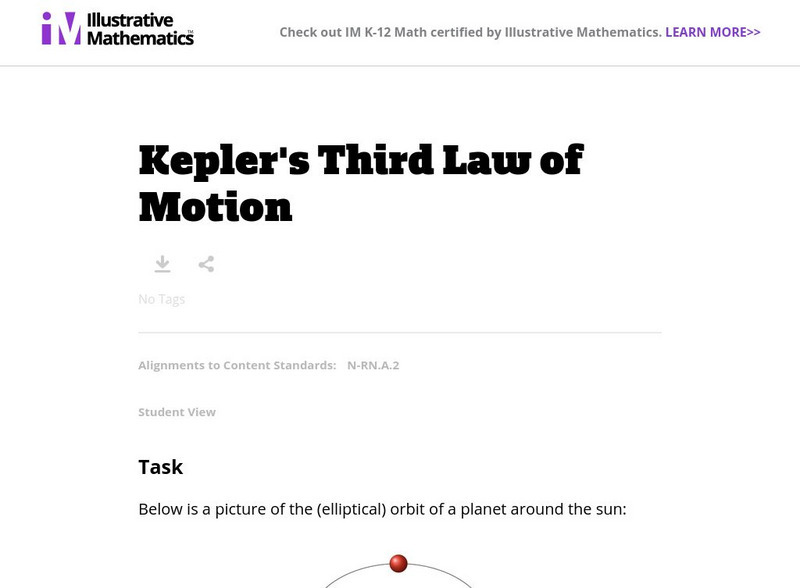OpenStax
Open Stax: Satellites and Kepler's Laws: An Argument for Simplicity
In the following interactive students will begin to understand the laws of Kepler regarding planetary motion and derive the third law of Kepler for circular orbits. They will also discuss the Ptolemaic model of the universe.
Georgia State University
Georgia State University: Hyper Physics: Kepler's Laws
An outstanding page describing Kepler's three laws of planetary motion.
Massachusetts Institute of Technology
Mit: Open Course Ware: Orbits of Planets and Satellites
Students explore orbits of planets and satellites. Some topics examined in the activities are planetary motion, angular momentum of orbits, and Kepler's laws. The resource consists of video clips, lecture notes, practice problems, and...
CK-12 Foundation
Ck 12: Physics Simulation: Orbital Motion
[Free Registration/Login Required] Understand angular momentum conservation in the absence of an applied torque in the context of planetary orbits using this interactive simulation. A PDF worksheet and a video tutorial are also...
Science Education Resource Center at Carleton College
Serc: Projectile and Satellite Orbits
This activity introduces gravity and Kepler's Laws and helps to develop an understanding of gravitational force, satellite orbits, and their dependence on the initial velocity.
Cornell University
Cornell University: Astronomy: Orbital Motion and Kepler's Laws
At this site from the Astronomy Department of Cornell University, Kepler's three laws of planetary motion are stated. There are brief explanations of each, along with links to additional information on related subjects.
NASA
Nasa: Kepler and His Laws
This site from NASA provides biographical details about the lives of Tycho Brahe and Johannes Kepler. Discusses Kepler's successes at developing laws of planeatry motion. States the three laws and discusses each one individually....
CK-12 Foundation
Ck 12: Physics: Gravitation Study Guide
This study guide on gravitation covers some key vocabulary, Kepler's Laws of Planetary Motion, and orbiting bodies or satellites. Includes important equations. It is available for download with free registration.
CK-12 Foundation
Ck 12 Exploration Series: Simulations: Physics: Journey to Mars
[Free Registration/Login Required] Learn about Kepler's Laws of motion by planning a trip to Mars using a Hohmann transfer orbit.
Physics Classroom
The Physics Classroom: The Apple, the Moon, and the Inverse Square Law
Describes the logic behind the development of Newton's law of universal gravitation. Beginning with Johannes Kepler and his three laws of planetary motion, content walks the reader through Newton's thought process and development of this...
Physics Classroom
The Physics Classroom: Kepler's Three Laws
The three laws of planetary motion as described by Kepler are stated and elaborated upon. Useful graphics and an easy-to-understand language are used to explain the nature of planetary motion. Both conceptual and mathematical. Includes a...
NASA
Nasa: Kepler's Third Law
This site from NASA states Kepler's third law of motion and extends it to develop an equation for the velocity of an orbiting planet.
Science Education Resource Center at Carleton College
Serc: Flight to Mars: How Long? Along What Path?
Demonstrate how, with the use of orbital mechanics, a space mission to Mars can be planned. Using no more than algebra, Kepler's laws and the formula for the energy of an object in a Kepler orbit, the exercise derives the time for an...
University of St. Andrews (UK)
University of St. Andrews: Orbits and Gravitation
A page describing the physics, mathematics, and historical figures associated with planetary motion, satellite motion, and universal gravitation.
Exploratorium
Exploratorium: Your Age on Other Worlds
How old would you be on Mars? Venus? Have fun plugging in your birthdate to see your age on other planets then read scroll down for a full explanation.
NASA
Nasa: Kepler's Second Law
This site from NASA states Kepler's second law of planetary motion and depicts its meaning with an informative diagram. Relates the law to conservation of energy principles and discusses the eccentricity of a satellite's (or a planet's)...
Physics Classroom
The Physics Classroom: Kepler's Second Law
Kepler's second law of planetary motion is stated and explained. An animation of the orbit of a planet and an accompanying graphic assists in explaining the meaning of the law of equal areas.
Texas Instruments
Texas Instruments: Multiple Choice Planetary Motion Study Cards
Kepler's Laws 1,2,3 including eccentricity of elliptical orbits. Good for reviewing planetary motions (NYS Earth Science).
Curated OER
Cornell University: Orbital Motion and Kepler's Laws
At this site from Cornell University, Kepler's three laws of planetary motion are stated. There are brief explanations of each. The laws are applied to explain the features of planetary orbits as well as the motion of binary star...
Science and Mathematics Initiative for Learning Enhancement (SMILE)
Smile: Paper Mache Solar System
This site from the Illinois Institute of Technology provides a set of directions for the creation of a solar system model out of paper mache. Includes orbital distances and planet diameters for the nine planets. Great idea for a student...
Physics Classroom
The Physics Classroom: Circular Motion Principles for Satellites
From The Physics Classroom. Uses easy- to-understand language to discuss how circular motion principles apply to the motion of satellites. Describes the tangential velocity and centripetal acceleration of a satellite. Includes many...
Physics Classroom
The Physics Classroom: Mathematics of Satellite Motion
The mathematics associated with the motion of satellites is described. Equations (for period, velocity, acceleration and force) are stated, symbols described, and sample problems solved. Includes five practice problems with solutions and...
Illustrative Mathematics
Illustrative Mathematics: N rn.a.2: Kepler's Third Law of Motion
The purpose of this task is to solve some expressions requiring fractional exponents in the modeling context of planetary motion. Aligns with N-RN.A.2.




